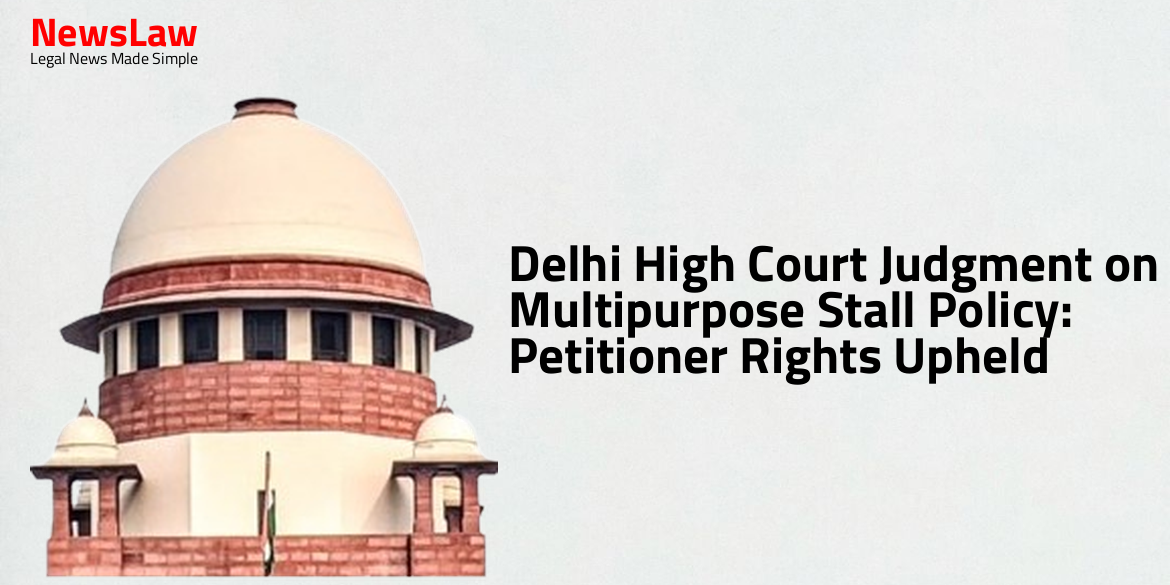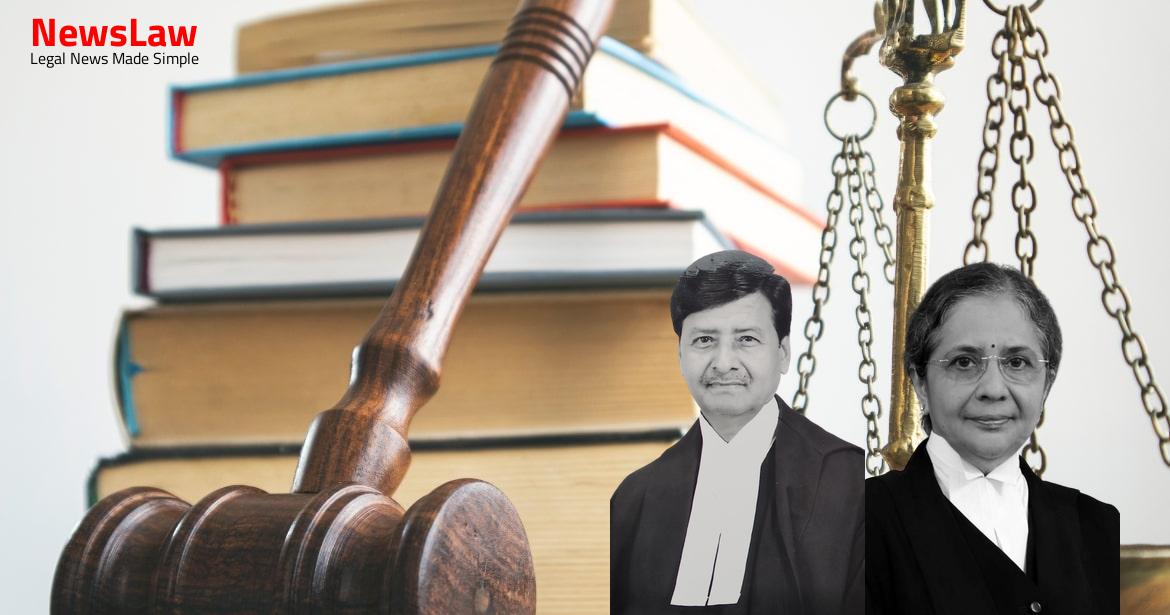In a significant legal development, the Delhi High Court has issued a judgment regarding the Multipurpose Stall Policy, where the rights of the petitioners have been upheld. The case involves challenges against the implementation of the 2017 Policy and the conversion of existing stalls to MPS units. Stay tuned for more insights on this crucial ruling.
Facts
- Petitioner no.1 was operating three MPS at Bareilly Railway Station.
- In 2017, the petitioners were forced to convert their stalls/trolleys to MPS due to the 2017 Policy.
- Letters dated 14.12.2022 extended the tenure of the petitioners’ licenses by 68 days until 27.02.2023 due to Covid-19 lockdown.
- Petitioner no.2 and the Railway Board executed a Master License Agreement dated 29.10.2021 with a tenure until 21.12.2022 with no extension or renewal clause.
- The petitioners were directed to vacate their MPS on 27.02.2023 as per the letters dated 14.12.2022.
- Petitioner no.3 and the Railway Board executed a Master License Agreement dated 17.08.2020.
- The petitioners also executed additional agreements to confirm the license arrangement, including a Master License Agreement dated 31.03.2021.
- The agreements executed with the Railway Board have been impugned in the petition.
Arguments
- The petitioners have a legitimate expectation that their licenses will be renewed throughout their lifetime and for future generations.
- The petitioners argue that Clause 5 of the 2017 Policy violates Article 14, Article 19(1)(g), and Article 21 of the Constitution by eliminating the right of license renewal and forcing existing licensees to compete against larger companies.
- They rely on various cases to support their argument and highlight the arbitrary nature of not renewing licenses of small miscellaneous/multipurpose stalls/trolleys despite renewing licenses of small catering units.
- The petitioners challenge the conversion of their stalls to MPS units under coercion and economic duress, emphasizing the need to prevent monopolization of licenses.
- Argument is made against the applicability of the 2017 policy to existing stalls/trolleys and the lack of renewal or extension provision in the policy.
- The petitioners seek an extension of the license period due to COVID-19 conditions and reduction in foot traffic at railway stations.
- They argue that paragraph 1744 of the Indian Railways Commercial Manual is the root cause for the demanded changes and challenge its validity.
- The petitioners maintain that their expectations were based on past practices and that they were not adequately informed about the new policy’s implications.
- Lastly, petitioners contest the exclusive jurisdiction clause in license agreements and emphasize the right to equal opportunity and livelihood under the 2017 Policy.
- The petitioner cannot revert to a previous policy after benefiting from the existing contract.
- The contract was for five years and non-renewable as per the award letter.
- The petitioner signed the contract knowingly and enjoyed its benefits for the entire duration.
- The case of South Central Railways was heavily relied upon by the petitioner.
- The Karnataka High Court rejected the petitioner’s argument citing the inapplicability of Catering Policy to the Multipurpose Stall Policy.
Analysis
- The 2017 Policy ensures rights of marginalized minorities and weaker sections of society are safeguarded.
- Petitioners are not entitled to perpetual renewal of their license.
- The doctrine of legitimate expectation cannot be claimed as a right.
- Clause 5 and Clause 11 of the 2017 Policy state no extension or renewal of MPS units, allowing participation in fresh bids.
- Petitioners’ claim of legitimate expectation for license renewal lacks merit.
- Challenges on the grounds of violation of fundamental rights or statutory rights are unsustainable.
- Extension of license period due to Force Majeure events was implemented.
- Implementation of Force Majeure was necessary due to the Covid-19 lockdown.
- Zonal Railways had discretion to determine the period of non-operation and extend license periods accordingly.
- The policy decision of the railway to re-tender all MPS units after tenure expiry does not violate right to livelihood of petitioners.
- The specific part of the judgment addresses point 55
- The extract from the judgment discusses a particular aspect of the case
- The content of point 55 is relevant to the case
- This part provides important information about the case
- Courts cannot delve into intricacies of factual situations at each railway station regarding extension of licenses.
- Granting relaxation due to changes in examination patterns in the past does not entitle petitioners to claim mandamus for relaxation in current situation.
- Mandamus cannot be issued to direct the enactment of laws or framing of rules.
- Mandamus is applicable for enforcement of fundamental or statutory rights or duties.
- Legitimate expectation does not always entitle expectant to relief, as public interest, policy changes, or conduct of the expectant can negate it.
- Public bodies like the respondent Board cannot arbitrarily decline to renew a license without compelling reasons.
- Judicial review of a policy decision is distinct from mandamus to frame policy in a specific manner.
- Judiciary has the jurisdiction to declare laws as unconstitutional.
- Individual license agreement and 2017 Policy contain an arbitration clause for resolving disputes related to Covid-19 situation.
- The arbitration clause allows petitioners to claim damages or address insufficiency of extension.
- Petitioners can initiate arbitration proceedings if aggrieved by the situation.
Decision
- Existing non-philanthropic stalls have the option to convert to MPS by paying a license fee.
- Stalls that choose not to convert can continue until the existing agreement ends.
- The petitioners are in agreement with converting their stalls and trolleys to MPS and paying revised fees.
- Space will be standardized and allotted for new MPS after the current agreement ends.
- The court deems the petitions maintainable and grants a 3-month transition period for petitioners to vacate stalls.
- No new allotments or renewals of existing stalls will be made by the railways as of now.
- Existing stalls/trolleys can be converted into MPS as per the policy.
- A 90-day period is given for the conversion option to be completed by each Division.
- The Multi Purpose Stall policy is effective immediately and supersedes previous policies.
- Existing licensees were given two options: convert to MPS with a 5-year tenure or continue with current stalls/trolleys.
- All pending applications are disposed of.
- The petitions are dismissed as the petitioners opted for conversion to MPS.
- The petitioner is running one stall and two trolleys for selling miscellaneous items.
- Renewal rights and remedies are kept open for petitioners.
- The conversion of stalls/trolleys to Multipurpose Stalls must follow all conditions and rules.
- The directives regarding conversion and dismissal of petitions are made accordingly.
Case Title: M/S HARISHANKAR AJAY AGRAWAL AND SONS Vs. UNION OF INDIA & ORS. (2024:DHC:4452)
Case Number: W.P.(C)-3461/2024



